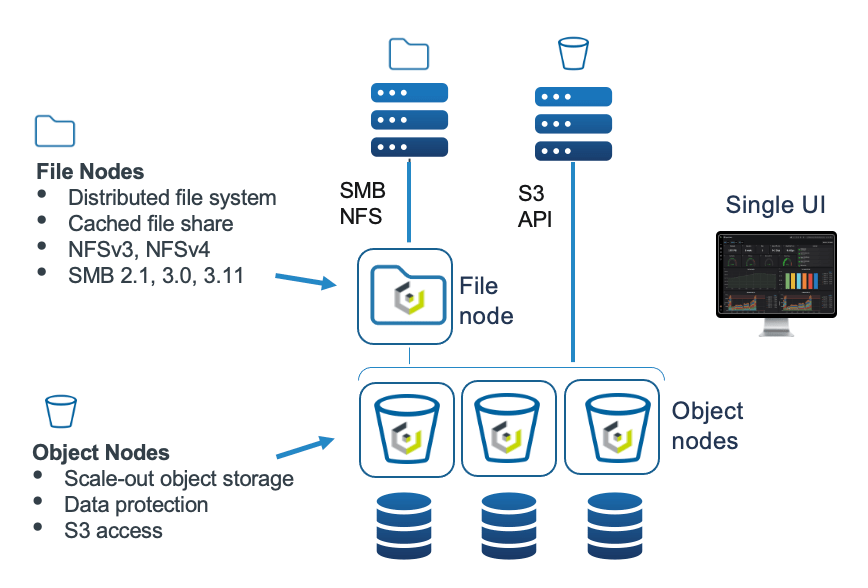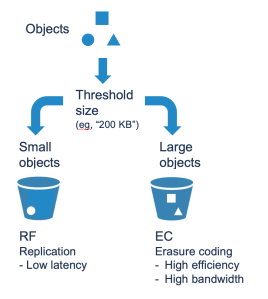Cloudian’s HyperStore 7.5.1 release includes important new security and file capabilities. Now offered are HyperStore File Services, KMIP support, and hybrid storage policies. Together, they help simplify management, boost the value of your data, and further enhance the security posture of HyperStore, already the industry’s most secure object storage platform.
File: HyperStore File Services
 For unified file and object management, Cloudian HyperStore 7.5.1 introduces HyperStore File Services, an efficient and streamlined approach to data management. HS 7.5.1 seamlessly integrates file cache functionality within the Cloudian HyperStore object storage system. Users get fast, local access to files – from either all-flash or HDD-based servers – and a limitlessly scalable central repository.
For unified file and object management, Cloudian HyperStore 7.5.1 introduces HyperStore File Services, an efficient and streamlined approach to data management. HS 7.5.1 seamlessly integrates file cache functionality within the Cloudian HyperStore object storage system. Users get fast, local access to files – from either all-flash or HDD-based servers – and a limitlessly scalable central repository.
This file caching solution offers a wide range of enterprise features: support for SMB/NFS protocols, VSS support for file versioning, and POSIX-compliance. It also combines next-generation capabilities such as unified management, converged bimodal data access support, and cloud integration to simplify data management both on-premises and in the cloud.
The Enterprise version of HyperStore File Services offers fault-tolerance in an active-active clustered platform. Also on the roadmap are snapshot and geo-distribution capabilities.
A key advantage of HyperStore File Services is the multi-tenancy capability that ensures secure and isolated data management when a single file cluster is shared by multiple groups or clients. Each group can be authenticated separately using a distinct Active Directory domain, allowing for segregation and efficient management of each group’s data.
HyperStore File Services is licensed by the capacity of the file caching node, and is available in two versions: Basic and Enterprise.
HyperStore File Services Basic Feature Set
- Multi-Protocol Access: SMB/NFS, POSIX compliant
- User Authentication: Active Directory and LDAP
- Acceleration Caching: Write file caching using NVMe, Read file caching using HDDs or SSD/NVMe
- Converged Data Access Support: VSS Support for File versioning, Access files directly to/from object storage, Allows S3-enabled applications to directly read/write file data
HyperStore File Services Enterprise Feature Set
Includes all Basic features, plus:
- High Availability: Active/Active HA (with cluster deployment), Non-disruptive failover
- Snapshots (planned): Point-in-time copies of file systems for protection of single files or entire file systems
- Geo-Distribution (planned): Allows file nodes to be located at multiple sites with access to a common file and object namespace, global file cache and object namespace
With Cloudian HyperStore File Services, businesses can experience simplified data management, enhanced collaboration, and improved security.
Security: KMIP Support
![]() As part of the HyperStore 7.5.1 release, we have also expanded our server-side encryption (SSE) capability to include seamless integration with the industry standard Key Management Interoperability Protocol (KMIP). This lets our customers to establish a robust, secure key management framework by effortlessly connecting HyperStore with any KMIP compliant third-party Key Management System (KMS). The integration of KMIP, an Oasis standard, not only broadens the range of compatible KMS options but also amplifies the security capabilities of HyperStore.
As part of the HyperStore 7.5.1 release, we have also expanded our server-side encryption (SSE) capability to include seamless integration with the industry standard Key Management Interoperability Protocol (KMIP). This lets our customers to establish a robust, secure key management framework by effortlessly connecting HyperStore with any KMIP compliant third-party Key Management System (KMS). The integration of KMIP, an Oasis standard, not only broadens the range of compatible KMS options but also amplifies the security capabilities of HyperStore.
To ensure extensive compatibility and smooth implementation, we have tested HyperStore 7.5.1 with popular KMS solutions, including Thales CipherTrust, Fortanix Data Security Manager, and Hashicorp Vault. To further streamline the integration process, we have integrated the Cryptsoft KMIP client into HyperStore. Cryptsoft’s extensive testing (and the significant involvement of their CTO in the development of the Oasis standard) ensures robust and reliable encryption and key management interoperability.
Performance: Hybrid Storage Policies
 This feature allows HyperStore to boost performance by dynamically adapting storage policies to the workload. Now, HyperStore can be application-aware, detecting the size of an object and — depending on its size — automatically placing that object in an optimally configured bucket. This puts an end to one-size-fits-all policies that limit performance.
This feature allows HyperStore to boost performance by dynamically adapting storage policies to the workload. Now, HyperStore can be application-aware, detecting the size of an object and — depending on its size — automatically placing that object in an optimally configured bucket. This puts an end to one-size-fits-all policies that limit performance.
Here’s how it works. Object storage buckets are protected from device failure by two techniques: 1) data replication (ie, multiple copies of data), and/or 2) erasure coding (ie, data striping across multiple devices). These two techniques offer different benefits. Data replication delivers low-latency data access, but is less storage-efficient. Erasure coding is efficient, but incurs more latency.
Which policy is best depends on the size of the object being stored.
- Large objects (think gigabytes per object): Storage efficiency is what matters here because it keeps costs down. The key performance metric in this case is bandwidth. Consequently, the best storage policy is erasure coding, since it boosts efficiency and bandwidth.
- Small objects (think kilobytes per object): Efficiency is less important here because the objects are, after all, small. For performance, latency is the key metric. The best policy is therefore data replication because it minimizes latency.
HyperStore’s new hybrid storage policies give you the best of both worlds. You set a size threshold. Objects above that size are dynamically assigned to a bucket protected by erasure coding. Objects below that size are assigned to to bucket protected by replication. This boosts performance at a minimal cost to overall efficiency. And it incurs zero management overhead.
These new security, search, performance and file capabilities make HyperStore even more complete, cementing its position as the industry’s most complete hybrid cloud data platform.
For more information, visit cloudian.com.
Or, for a FREE TRIAL, click here.


